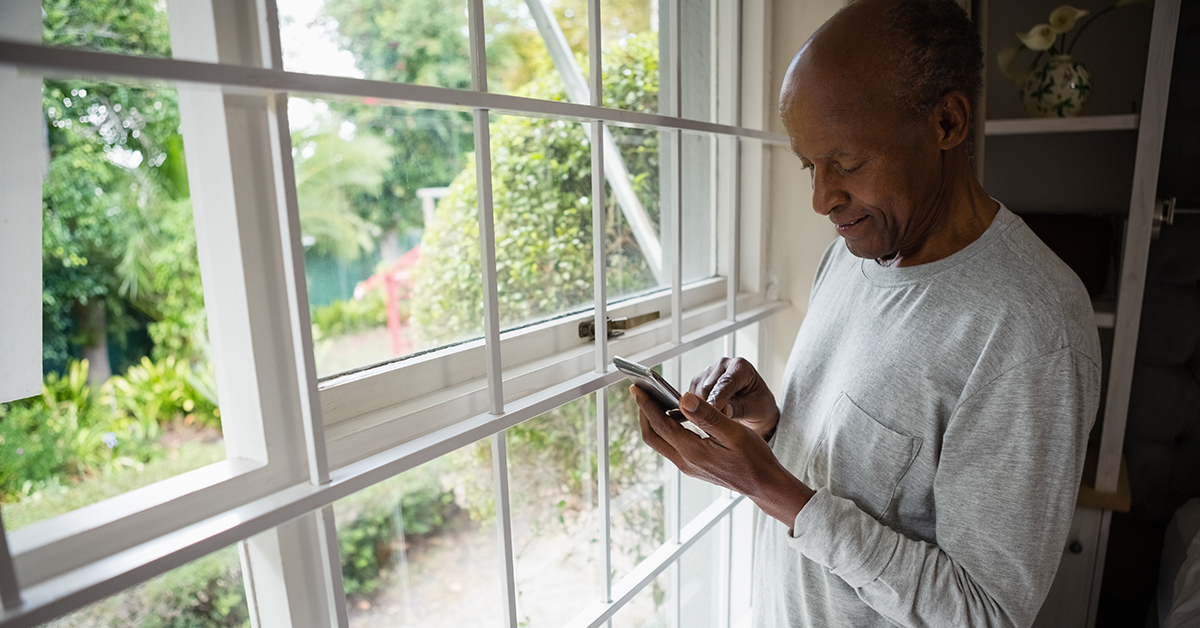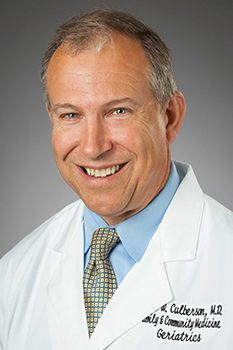Mental Health During COVID-19: A Focus on The Elderly
The elderly are physically and mentally vulnerable during the COVID-19 pandemic. Here’s how you can help.

We’ve been hearing a lot about the physical risks of COVID-19 that the elderly face. But another concern is their mental health.
The COVID-19 pandemic has brought challenges that few could have anticipated, and it appears that we are in for many more months of the unknown. While much attention has been focused on maintaining physical health and safety, health professionals are also expressing increasing concern for mental health as stay-at-home orders, social distancing and general isolation continues in various forms across the globe. As we know, our elderly population is at great risk from the Coronavirus. But what about the mental toll the pandemic is taking?
John Culberson, M.D., director of clinical geriatric programs at the Garrison Institute on Aging and associate professor of Family and Community Medicine for the Texas Tech University Health Sciences Center (TTUHSC) School of Medicine, recently spoke about this concern and how we can help in a Facebook interview KCBD NewsChannel 11.
“Most people, at some time in their lives, have found themselves alone and worried about something,” Culberson said. “This (COVID-19) is just a perfect storm for individuals who were concerned anyway about how they were going to make it.”
Senior Citizens: Physically and Mentally Vulnerable
We’ve been hearing a lot in the news about the specific physical risk factors of COVID-19 that the elderly face. But a primary concern for Culberson is also their mental fragility.
“As people age, they become vulnerable, and one thing could tip them in the wrong direction,” he explained. “I really think that being isolated and fearful and anxious is something that’s really going to take a toll on some of our older adults.”
Culberson also acknowledged that many older adults were already living isolated lives before the pandemic began. Now, they are being deprived of the normal, albeit infrequent, social interactions they were accustomed to.
“Those individuals are probably suffering more than usual because they’re watching TV,” he says. “They’re hearing all this news about how vulnerable they are and how important it is for them to stay at home.” Not to mention the dire statistics regularly reported about the virus sweeping through long-term care facilities. “They’re just terrified,” Culberson says.
Even with elderly couples quarantining together, there is the mental stress and worry of the other getting sick. Culberson said that many of his patients told him they worry more for their spouse than themselves.
Clearly these ingredients of isolation and fear are a recipe for loneliness and depression. So, what can we do to help the elderly through times of isolation?
Helping the Elderly During Isolation: Communication and Reassurance Are Key

John Culberson, M.D.
“This is where communication with family members is key,” Culberson says. “This is a time to check in with your older relatives.”
He encourages setting up a schedule for communication, because it’s something elderly family members can look forward to and provides needed structure.
Check in more than usual, he encourages. “If you typically call every few days, to try calling every few hours,” he says. “Let them tell you it’s too much.”
Help them create a schedule and a structure for their daily lives that includes some form of activity. It can include simply walking in their own space or another safe space they have available.
He says that phone calls work great, as many elderly individuals still may not be comfortable with technology like Skype, FaceTime or the suddenly ubiquitous Zoom.
However, while he acknowledges many are wary of having visitors, if you follow proper procedures, Culberson says that it’s acceptable to set up teleconferencing for your elderly relative if they don’t have it in their home. But follow these precautions:
- Limit your time in their space
- Wear a mask
- Maintain social distancing
- Wash your hands
- Use cleaning wipes on surfaces
COVID-19: We’re All at Risk
As the news continues to pour in and we continue to learn more about COVID-19, it’s important to remember that all of us are at risk from the virus, not just the elderly. We should work together to continue to follow CDC and scientifically sound guidelines to slow the spread and show we care.
“Do the best you can to take care of yourself,” Culberson says. “But really everyone should be doing that. Older adults shouldn’t be doing more than younger adults.
“They need confidence, love and support,” Culberson added.
These are needs we can all relate to. These are needs that have been met at one time or another by a parent or grandparent providing comfort or joy. Let’s take the time to touch base with those who need it the most, and who have given the most.
Related Stories
Celebrating Veterans: TTUHSC’s General Martin Clay’s Legacy of Service and Leadership
From his initial enlistment in the Army National Guard 36 years ago to his leadership in military and civilian health care management roles, Major General Martin Clay’s career has been shaped by adaptability, mission focus and service to others.
Texas Tech University Health Sciences Center School of Nursing Named Best Accelerated Bachelor of Science in Nursing Program in Texas
The TTUHSC School of Nursing Accelerated Bachelor of Science in Nursing (BSN) program has been ranked the No. 1 accelerated nursing program in Texas by RegisteredNursing.org.
TTUHSC Names New Regional Dean for the School of Nursing
Louise Rice, DNP, RN, has been named regional dean of the TTUHSC School of Nursing on the Amarillo campus.
Recent Stories
The John Wayne Cancer Foundation Surgical Oncology Fellowship Program at Texas Tech University Health Sciences Center Announced
TTUHSC is collaborating with the John Wayne Cancer Foundation and has established the Big Cure Endowment, which supports the university’s efforts to reduce cancer incidence and increase survivability of people in rural and underserved areas.
TTUHSC Receives $1 Million Gift from Amarillo National Bank to Expand and Enhance Pediatric Care in the Panhandle
TTUHSC School of Medicine leaders accepted a $1 million philanthropic gift from Amarillo National Bank on Tuesday (Feb. 10), marking a transformational investment in pediatric care for the Texas Panhandle.
Texas Tech University Health Sciences Center Permian Basin Announces Pediatric Residency Program Gift
TTUHSC Permian Basin, along with the Permian Strategic Partnership and the Scharbauer Foundation, Feb. 5 announced a gift that will fund a new pediatric residency.
